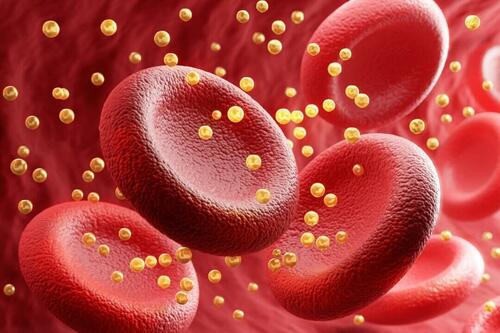
Authored by Sheramy Tsai via The Epoch Times (emphasis ours),
For decades, low-density lipoprotein (LDL) cholesterol has been commonly referred to as “bad cholesterol” due to its association with increased risks of cardiovascular diseases (CVD), such as heart attacks and strokes.
However, a new study involving more than 4 million people across China challenges this belief, suggesting LDL may not be as harmful as previously thought—at least, not for everyone.
Research led by Dr. Liang Chen and colleagues reveals a more nuanced picture. While high LDL levels are linked to increased mortality in some groups, they do not pose the same risk for others, they found. The relationship between LDL and mortality varies significantly based on an individual’s cardiovascular disease risk and overall health status.
These findings suggest reconsidering the one-size-fits-all approach to cholesterol management. Instead, personalized treatment strategies may be essential for effectively managing cholesterol and improving health outcomes.

About the Study
The study participants were part of the China Health Evaluation and Risk Reduction through Nationwide Teamwork (ChinaHEART) project, which included individuals aged 35 to 75 from various regions across China.
Participants were divided into three groups based on their risk of atherosclerotic cardiovascular disease (ASCVD), a heart disease caused by plaque buildup on artery walls:
- Low-risk group: Individuals with no history of cardiovascular disease and a low estimated risk of developing it.
- Primary prevention group: Individuals with high-risk factors for cardiovascular disease but no established disease.
- Secondary prevention group: Individuals with a history of cardiovascular disease.
Researchers tracked data from these participants, including cholesterol levels and lifestyle choices like smoking and drinking habits. They also considered medical histories, including conditions such as diabetes and chronic obstructive pulmonary disease. The goal was to determine how different LDL cholesterol levels impacted their mortality risk, particularly from heart disease.
Over an average follow-up period of 4.6 years, the study recorded nearly 93,000 deaths, with over 38,000 attributed to cardiovascular issues. The results revealed a U-shaped association between LDL cholesterol levels and mortality in the low-risk and primary prevention groups, indicating that both very high and very low levels of LDL were associated with increased mortality.
In the secondary prevention group, the association was J-shaped, meaning extremely low LDL levels were linked to a higher risk of death, while moderate levels were associated with the lowest risk.
According to the American Heart Association, “normal” LDL levels are considered less than 100 milligrams per deciliter (mg/dL). Levels above 160 mg/dL are categorized as high, and those below 70 mg/dL are deemed very low. However, the study found that the optimal LDL levels for reducing cardiovascular mortality varied among the groups:
- Low-risk group: 117.8 mg/dL
- Primary prevention group: 106.0 mg/dL
- Secondary prevention group: 55.8 mg/dL
The American Heart Association states that “various research studies on LDL have shown ‘lower is better.’” However, these findings suggest this may not always be true. The study indicates that “lower LDL-C targets with increasing ASCVD risk should be considered for reducing CVD mortality.”
The study also discovered that people with diabetes might need stricter cholesterol control than those without. It found that the optimal LDL cholesterol level to reduce heart-related deaths in people with diabetes is 87 mg/dL, while for non-diabetics, it is 114.6 mg/dL.
The study authors acknowledged that low LDL cholesterol levels might result from serious health issues rather than cause higher death rates. They excluded people with chronic diseases from their analysis but still found a link between low LDL levels and higher death rates. This suggests other factors, like frailty, might be involved. More research is needed to understand these relationships fully.
Dr. Jack Wolfson, a cardiologist and owner of Natural Heart Doctor, explained the study’s findings to The Epoch Times. He stated that very low LDL cholesterol levels could indicate liver dysfunction, where the liver can’t produce enough LDL. Conversely, very high LDL levels suggest the body isn’t clearing it properly, both scenarios leading to higher health risks.
Evolving Views on Cholesterol
The American Heart Society describes cholesterol as a waxy substance essential for building cell membranes and producing hormones. Cholesterol travels through the bloodstream in particles called lipoproteins, primarily as low-density lipoprotein (LDL) and high-density lipoprotein (HDL).
LDL, often called “bad cholesterol,” carries cholesterol to cells and arteries, where it can form plaques, narrowing the arteries and increasing the risk of heart attack and stroke. Conversely, HDL, known as “good cholesterol,” transports cholesterol from the arteries to the liver for elimination, according to an article by Dr. Ami B. Bhatt, a cardiologist and Chief Innovation Officer at the American College of Cardiology.
Dr. Wolfson challenges the notion that LDL is purely harmful. “There’s no such thing as ‘bad cholesterol,’” he said. “All mammals have LDL—they perform many functions. When oxidized, they could be considered ‘bad,’ but this may only reflect general oxidative stress.” He explained that the presence of oxidized LDL (ox-LDL) might indicate underlying issues rather than being the problem itself.
Recent research has shifted the focus from LDL quantity to particle size. Larger LDL particles are less harmful than smaller, denser ones, which are more likely to penetrate arterial walls and form plaques. Experts like Dr. Ronald Krauss, a senior scientist and director of Atherosclerosis Research at Children’s Hospital Oakland Research Institute, have emphasized that small, dense LDL particles are more likely to form artery plaques than larger, buoyant ones. Dr. Krauss, who has published more than 400 papers on this topic, highlights the significance of particle size in assessing cardiovascular risk.
The HDL-to-LDL ratio also emerges as a better predictor of heart disease risk than LDL levels alone. A high ratio indicates a greater proportion of protective HDL, reducing cardiovascular event risks, as noted in a 2022 BMC Cardiovascular Disorders study.
Dr. Wolfson cautions against a one-size-fits-all approach to cardiovascular health and cholesterol. “Each individual has a perfect level for themselves,” he said. “What is good for you may be high or low for me.”
He advocates for evaluating inflammation in the body, the underlying cause of heart disease. He recommends markers of inflammation and oxidative stress, such as c-reactive protein, phospholipase A2, and ox-LDL, as better predictors of cardiovascular risk than LDL alone.
As research progresses, a more tailored approach to cholesterol management could improve cardiovascular health outcomes.
Authored by Sheramy Tsai via The Epoch Times (emphasis ours),
For decades, low-density lipoprotein (LDL) cholesterol has been commonly referred to as “bad cholesterol” due to its association with increased risks of cardiovascular diseases (CVD), such as heart attacks and strokes.
However, a new study involving more than 4 million people across China challenges this belief, suggesting LDL may not be as harmful as previously thought—at least, not for everyone.
Research led by Dr. Liang Chen and colleagues reveals a more nuanced picture. While high LDL levels are linked to increased mortality in some groups, they do not pose the same risk for others, they found. The relationship between LDL and mortality varies significantly based on an individual’s cardiovascular disease risk and overall health status.
These findings suggest reconsidering the one-size-fits-all approach to cholesterol management. Instead, personalized treatment strategies may be essential for effectively managing cholesterol and improving health outcomes.

About the Study
The study participants were part of the China Health Evaluation and Risk Reduction through Nationwide Teamwork (ChinaHEART) project, which included individuals aged 35 to 75 from various regions across China.
Participants were divided into three groups based on their risk of atherosclerotic cardiovascular disease (ASCVD), a heart disease caused by plaque buildup on artery walls:
- Low-risk group: Individuals with no history of cardiovascular disease and a low estimated risk of developing it.
- Primary prevention group: Individuals with high-risk factors for cardiovascular disease but no established disease.
- Secondary prevention group: Individuals with a history of cardiovascular disease.
Researchers tracked data from these participants, including cholesterol levels and lifestyle choices like smoking and drinking habits. They also considered medical histories, including conditions such as diabetes and chronic obstructive pulmonary disease. The goal was to determine how different LDL cholesterol levels impacted their mortality risk, particularly from heart disease.
Over an average follow-up period of 4.6 years, the study recorded nearly 93,000 deaths, with over 38,000 attributed to cardiovascular issues. The results revealed a U-shaped association between LDL cholesterol levels and mortality in the low-risk and primary prevention groups, indicating that both very high and very low levels of LDL were associated with increased mortality.
In the secondary prevention group, the association was J-shaped, meaning extremely low LDL levels were linked to a higher risk of death, while moderate levels were associated with the lowest risk.
According to the American Heart Association, “normal” LDL levels are considered less than 100 milligrams per deciliter (mg/dL). Levels above 160 mg/dL are categorized as high, and those below 70 mg/dL are deemed very low. However, the study found that the optimal LDL levels for reducing cardiovascular mortality varied among the groups:
- Low-risk group: 117.8 mg/dL
- Primary prevention group: 106.0 mg/dL
- Secondary prevention group: 55.8 mg/dL
The American Heart Association states that “various research studies on LDL have shown ‘lower is better.’” However, these findings suggest this may not always be true. The study indicates that “lower LDL-C targets with increasing ASCVD risk should be considered for reducing CVD mortality.”
The study also discovered that people with diabetes might need stricter cholesterol control than those without. It found that the optimal LDL cholesterol level to reduce heart-related deaths in people with diabetes is 87 mg/dL, while for non-diabetics, it is 114.6 mg/dL.
The study authors acknowledged that low LDL cholesterol levels might result from serious health issues rather than cause higher death rates. They excluded people with chronic diseases from their analysis but still found a link between low LDL levels and higher death rates. This suggests other factors, like frailty, might be involved. More research is needed to understand these relationships fully.
Dr. Jack Wolfson, a cardiologist and owner of Natural Heart Doctor, explained the study’s findings to The Epoch Times. He stated that very low LDL cholesterol levels could indicate liver dysfunction, where the liver can’t produce enough LDL. Conversely, very high LDL levels suggest the body isn’t clearing it properly, both scenarios leading to higher health risks.
Evolving Views on Cholesterol
The American Heart Society describes cholesterol as a waxy substance essential for building cell membranes and producing hormones. Cholesterol travels through the bloodstream in particles called lipoproteins, primarily as low-density lipoprotein (LDL) and high-density lipoprotein (HDL).
LDL, often called “bad cholesterol,” carries cholesterol to cells and arteries, where it can form plaques, narrowing the arteries and increasing the risk of heart attack and stroke. Conversely, HDL, known as “good cholesterol,” transports cholesterol from the arteries to the liver for elimination, according to an article by Dr. Ami B. Bhatt, a cardiologist and Chief Innovation Officer at the American College of Cardiology.
Dr. Wolfson challenges the notion that LDL is purely harmful. “There’s no such thing as ‘bad cholesterol,’” he said. “All mammals have LDL—they perform many functions. When oxidized, they could be considered ‘bad,’ but this may only reflect general oxidative stress.” He explained that the presence of oxidized LDL (ox-LDL) might indicate underlying issues rather than being the problem itself.
Recent research has shifted the focus from LDL quantity to particle size. Larger LDL particles are less harmful than smaller, denser ones, which are more likely to penetrate arterial walls and form plaques. Experts like Dr. Ronald Krauss, a senior scientist and director of Atherosclerosis Research at Children’s Hospital Oakland Research Institute, have emphasized that small, dense LDL particles are more likely to form artery plaques than larger, buoyant ones. Dr. Krauss, who has published more than 400 papers on this topic, highlights the significance of particle size in assessing cardiovascular risk.
The HDL-to-LDL ratio also emerges as a better predictor of heart disease risk than LDL levels alone. A high ratio indicates a greater proportion of protective HDL, reducing cardiovascular event risks, as noted in a 2022 BMC Cardiovascular Disorders study.
Dr. Wolfson cautions against a one-size-fits-all approach to cardiovascular health and cholesterol. “Each individual has a perfect level for themselves,” he said. “What is good for you may be high or low for me.”
He advocates for evaluating inflammation in the body, the underlying cause of heart disease. He recommends markers of inflammation and oxidative stress, such as c-reactive protein, phospholipase A2, and ox-LDL, as better predictors of cardiovascular risk than LDL alone.
As research progresses, a more tailored approach to cholesterol management could improve cardiovascular health outcomes.
Loading…




